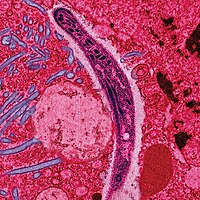
Photo from wikipedia
Introduction: Neisseria gonorrhoea (NG) is gaining resistance to last line cephalosporins; conferring resistance to almost all antimicrobials used to treat it since the 1930s. NG disproportionately affects men-who-have-sex-with-men (MSM) and… Click to show full abstract
Introduction: Neisseria gonorrhoea (NG) is gaining resistance to last line cephalosporins; conferring resistance to almost all antimicrobials used to treat it since the 1930s. NG disproportionately affects men-who-have-sex-with-men (MSM) and sex workers. Neisseria are particularly apt at horizontal gene transmission within the genus. Genetic analysis of resistant NG found fragments from N. cinerea and N. perflava, common commensals of the oropharynx. Nearly all global cases of ceftriaxone resistant NG are reported from pharyngeal samples. Self-medication with antibiotics is prevalent in Vietnam and MSM of Hanoi have high rates of STIs. Methods MSM from Hanoi, Vietnam were surveyed regarding health seeking behaviours, including antibiotic usage. Pharyngeal swabs from a subset of participants were collected and assessed for commensal Neisseria prevalence, as well as characterisation of antimicrobial susceptibility to ciprofloxacin, cefixime, ceftriaxone, and cefpodoxime. Results Thirty-nine MSM were surveyed. Median age was 23, 72.7% have sex only with men, and 18.2% have exchanged sex to receive food, money, or work. Any antibiotic use was 82% in the past 6 months and 33% in the past 30 days. In the past 6 months, use of cefixime and ceftriaxone was 15% and 9%, respectively. Ever use of antibiotics without a prescription was 64%.At least one commensal Neisseria was isolated from every participant, with prevalence of N. cinerea (14.3%), N. flavescens (57.1%), N. mucosa (28.6%), N. subflava (50%). Using CLSI MIC breakpoints for N. gonorrhoea as a proxy, “reduced susceptibility” to ciprofloxacin, cefixime, ceftriaxone, and cefpodoxime was found among 47.1%, 11.8%, 11.8%, and 29.4% of all isolates, respectively; 52.9% were “resistant” to ciprofloxacin. Conclusion MSM of Hanoi were likely to take antibiotics without a prescription. Commensal Neisseria were very prevalent from pharyngeal samples; some may have reduced susceptibility or resistance to common antibiotics. More data is needed to appropriately interpret antimicrobial susceptibility for these commensals.
Journal Title: Sexually Transmitted Infections
Year Published: 2017
Link to full text (if available)
Share on Social Media: Sign Up to like & get
recommendations!